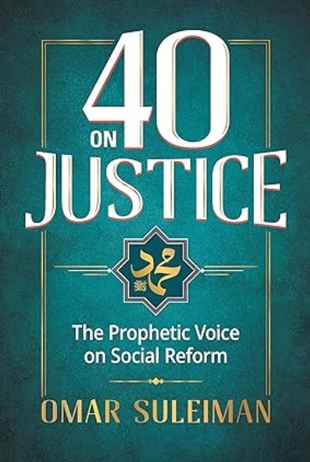Omar Suleiman is a Palestinian American from New Orleans, Louisiana, an imam1, scholar, social justice activist, public speaker, and author. He is an adjunct professor of Islamic studies and member of the Ethics Center Advisory Board at Southern Methodist University in University Park, Texas. He is also the founder and president of the Yaqeen Institute for Islamic Research.
While Oman Suleiman is well-known for his public speaking and activism, he is the author of numerous books providing religious instruction, such as Allah Loves…, Prayers of the Pious, Meeting Muhammad, Jannah: Home at Last, Judgement Day: Deeds that Light the Way, Angels in Your Presence, For Those Left Behind: Guidance on Death and Grieving, and The Virtues of Dhul Hijjah2, as well as papers on topics related to Islamic ethics, religion, culture, and activism.
In 40 on Justice, Suleiman offers forty hadith (reports on the Prophet Muhammad’s words and actions, may the peace and blessings of Allah be upon him) and robust commentary on social justice issues. Chapters cover topics from basic human rights to marriage, leadership, the elderly, disabilities, racism, family, and the environment. Suleiman also addresses topics where there has often been misunderstanding, such as slavery and gender equality. Each chapter includes historical context for the hadith that is the focus of the chapter, related hadith and ayats (verses of the Qur’an), and thoughtful commentary from a modern-day perspective. Suleiman thoroughly explains Islamic guidance for each of the topics, and often closes each section with his own summary prayer. In this way, Suleiman offers both motivation and instruction for applying the prophetic example to today’s social justice issues.
try a spiritual practice on justice
1
Imams lead the ritual prayers and perform the sermon for the Friday noon prayers that are obligatory for Muslim men (voluntary for Muslim women); they often provide religious guidance and leadership in their communities.
2
Dhul Hijjah is the twelfth month of the Islamic calendar during which Hajj (the Islamic pilgrimage) and the holiday Eid al-Adha (Feast of Sacrifice) take place.
